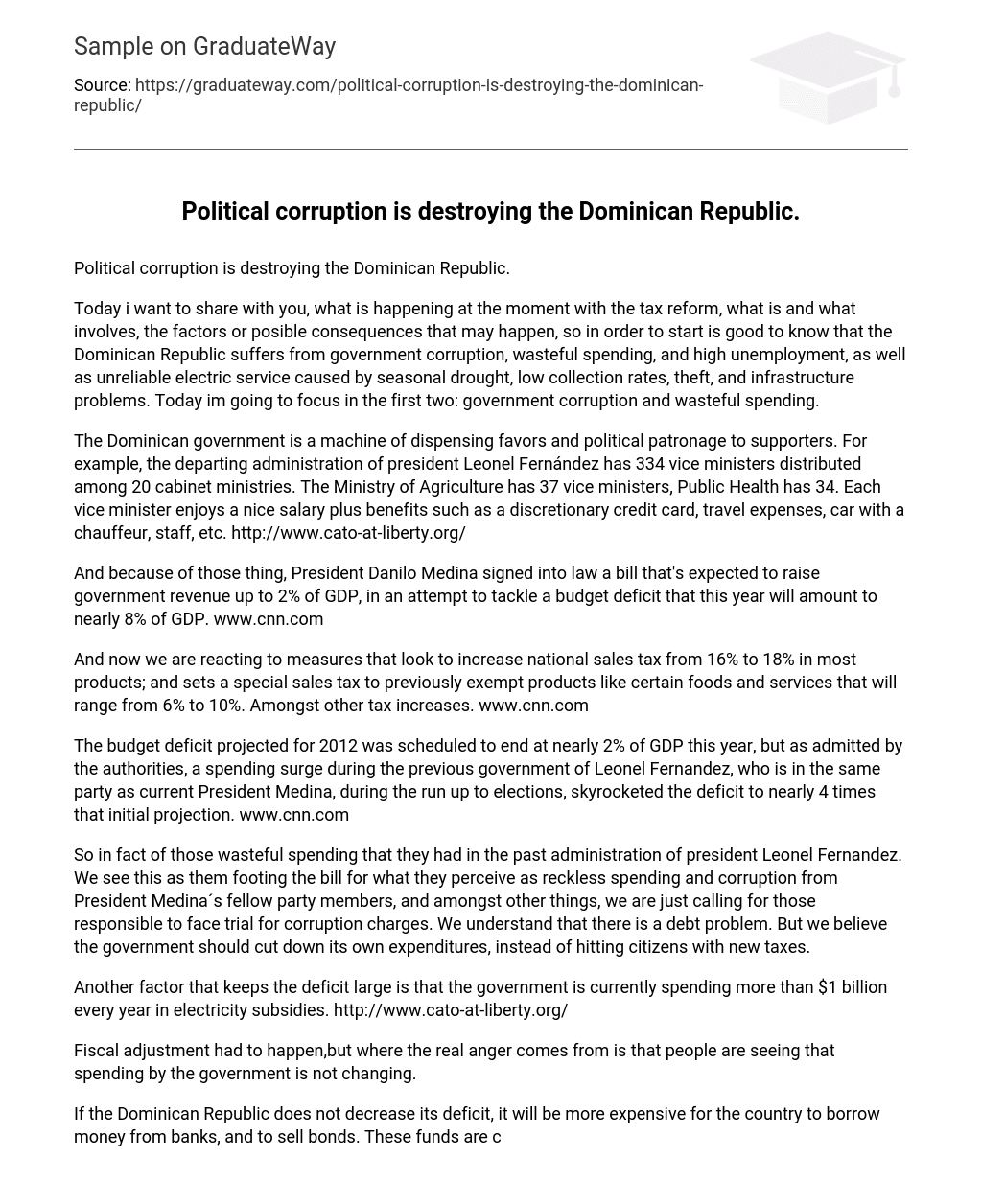Today, I would like to address the current tax reform situation in the Dominican Republic and its consequences. It is crucial to comprehend that the country is grappling with issues including government corruption, extravagant expenditures, elevated unemployment rates, and unreliable electricity service caused by factors such as seasonal droughts, low collection rates, theft, and infrastructure dilemmas. For now, our attention will be directed towards government corruption and squandering of resources.
According to http://www.cato-at-liberty.org/, the government of the Dominican Republic operates by granting favors and political patronage to its supporters. This can be seen in the recent administration led by President Leonel Fernández, where there are a total of 334 vice ministers spread across 20 cabinet ministries. It is worth noting that the Ministry of Agriculture alone has 37 vice ministers, while Public Health has 34. These vice ministers receive attractive salaries and benefits including a discretionary credit card, travel expenses, chauffeur-driven cars, and staff.
President Danilo Medina has given the green light to legislation that aims to boost government revenue by up to 2% of GDP, as reported on CNN’s website. The objective is to tackle a budget deficit estimated at approximately 8% of GDP for this year.
Currently, there are discussions about increasing the national sales tax rate from 16% to 18% for most items. Additionally, there are plans to introduce a new sales tax ranging from 6% to 10% on goods and services that were previously exempt, including certain foods. These measures are part of a larger set of tax hikes.
Initially, it was estimated that the budget deficit for 2012 would be around 2% of GDP. However, due to increased spending by the previous government led by Leonel Fernandez – who belongs to the same party as President Medina – the deficit turned out to be almost four times higher than expected.
Regarding the excessive spending in President Leonel Fernandez’s previous administration, the current government is taking measures to hold accountable those responsible for what they perceive as irresponsible spending and corruption within President Medina’s party. We advocate for charging those implicated with corruption. While we recognize the debt issue, we strongly urge the government to decrease its own expenses instead of imposing an extra tax burden on citizens.
According to Cato at Liberty, the government’s current expenditure of over $1 billion annually in electricity subsidies is one reason for the large deficit.
Despite the necessity of fiscal adjustment, anger arises from the unchanged government spending.
If the Dominican Republic does not decrease its deficit, it will become more expensive for the country to obtain loans from banks and issue bonds. These financial resources are vital for implementing poverty reduction programs and educational projects that are essential for the nation. President Medina had promised to undertake these initiatives during his presidential campaign.
Increased government austerity and a thriving economy may allow the country to resolve its deficit problem through economic growth.
Because of the taxes we pay and our perception of insufficient benefits, we view the country’s large deficit as a consequence of both corruption within the government and excessive spending. Despite considering myself apolitical, I reached my breaking point due to the fiscal reform package.
When a disillusioned population, tired of corrupt politicians like us, needs a change, electing an outsider as president becomes necessary. Alternatively, there is an increasing belief that the country demands a significant shift from its present condition.
Carmen Rosa Báez
2009-5841





